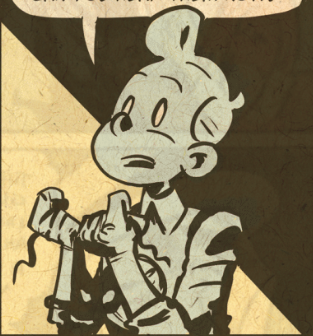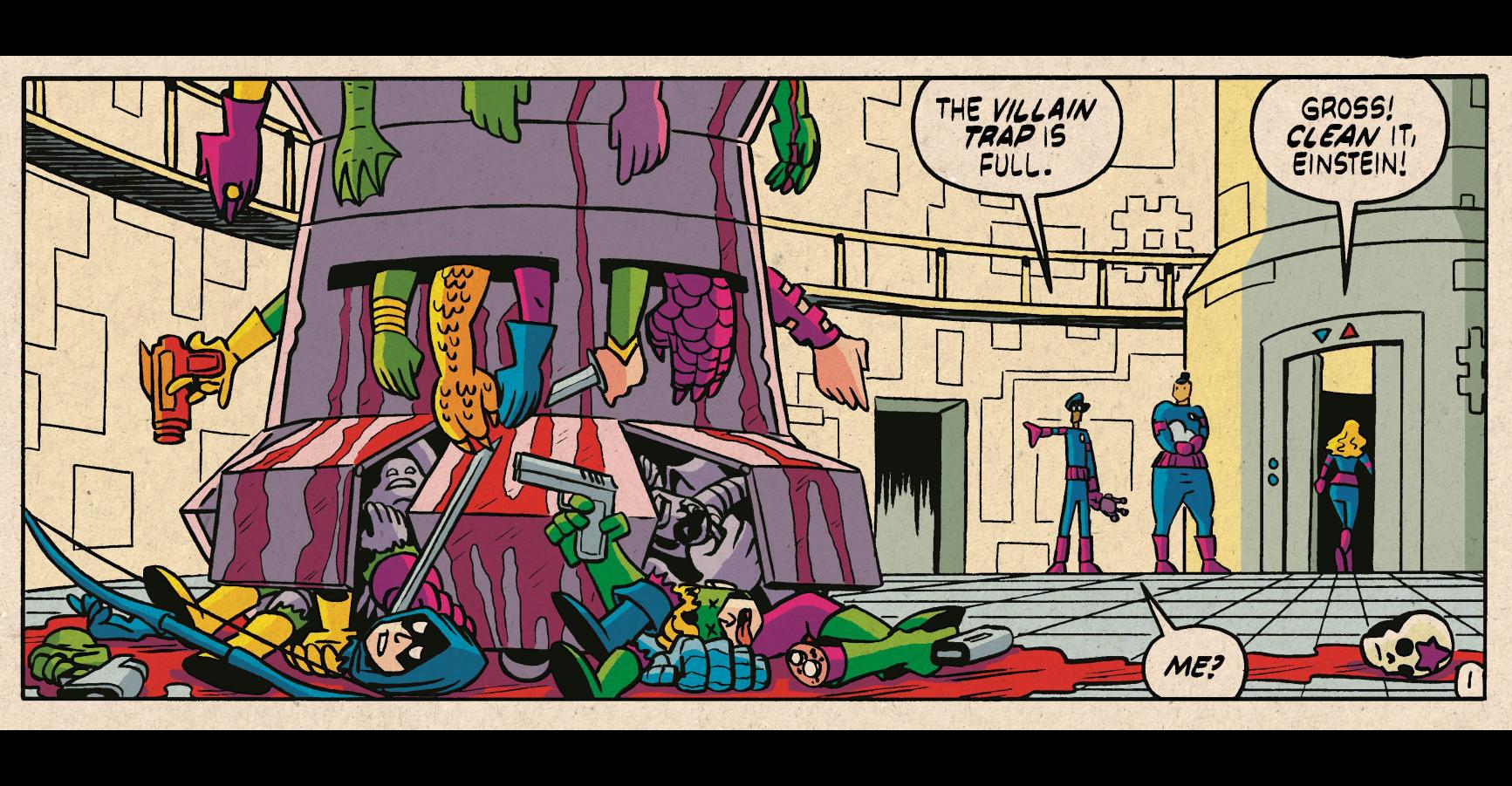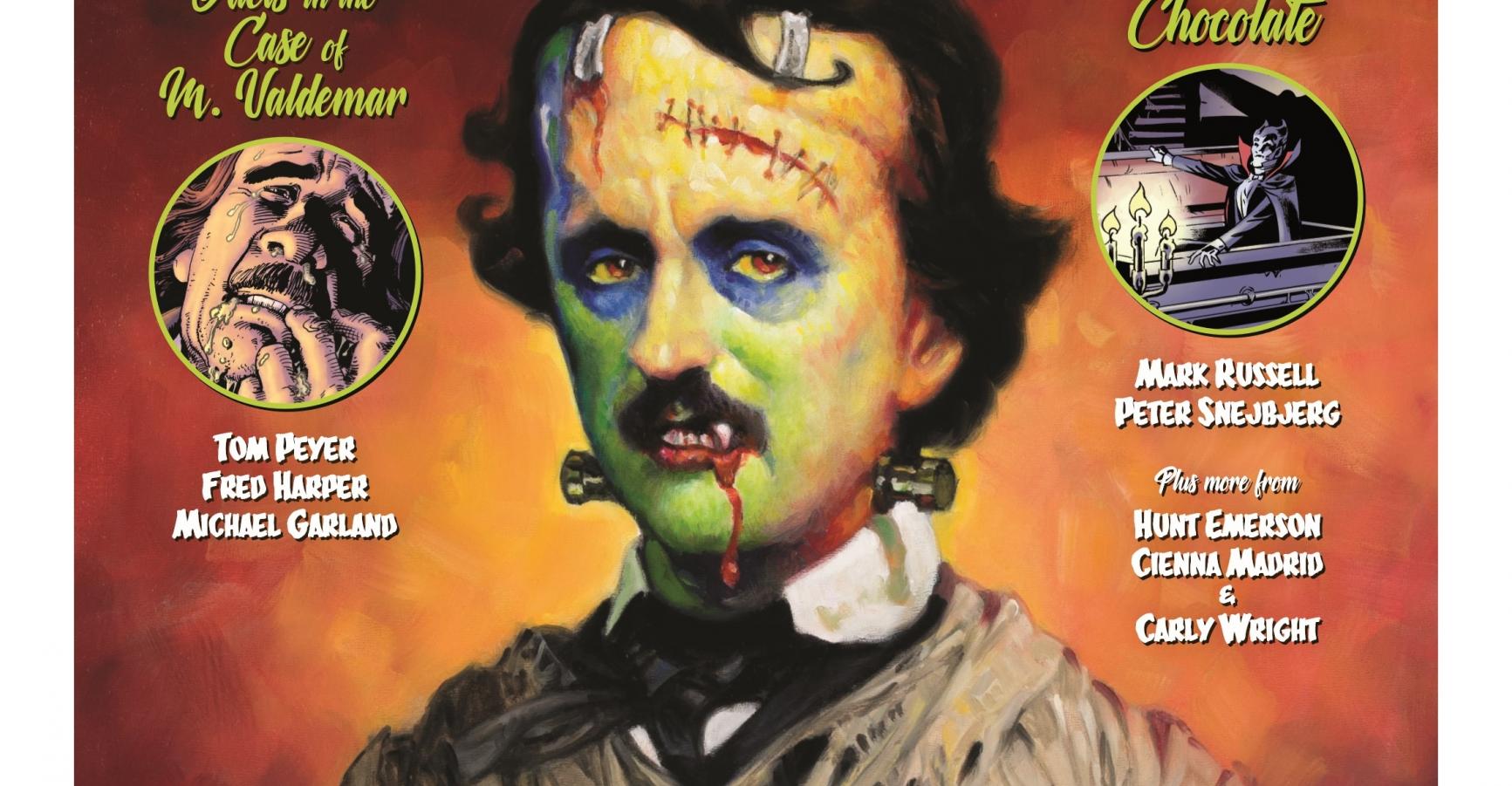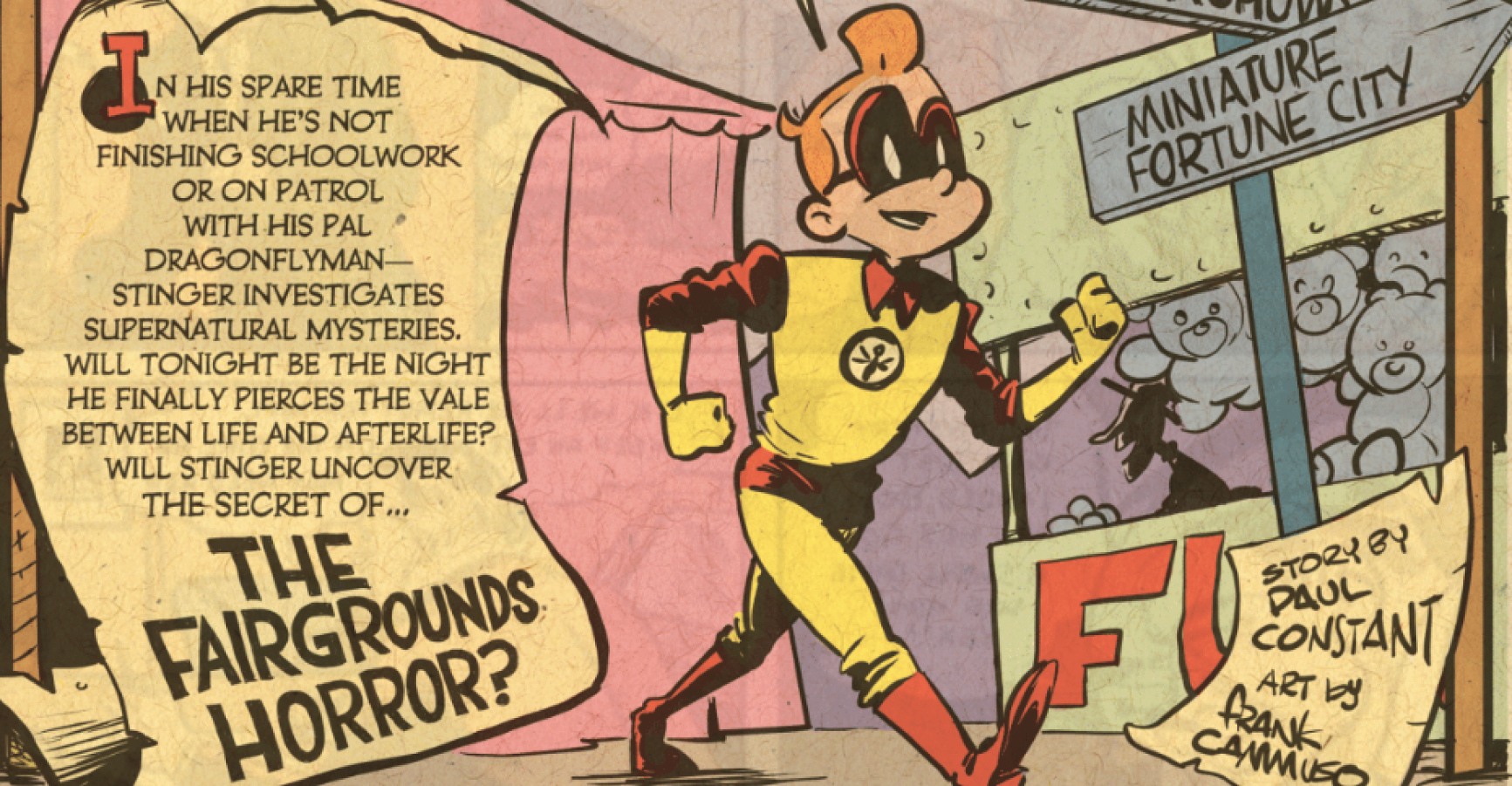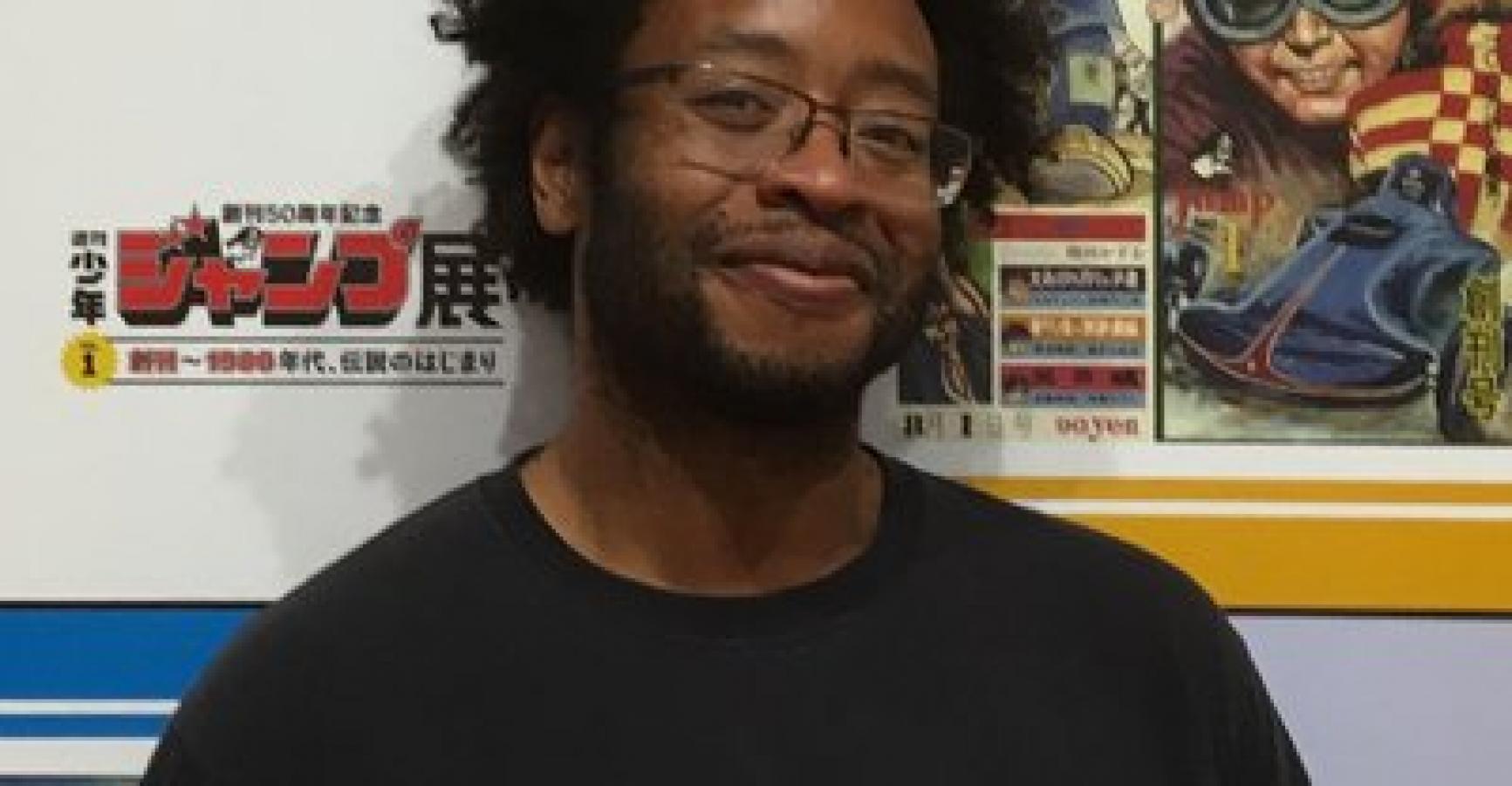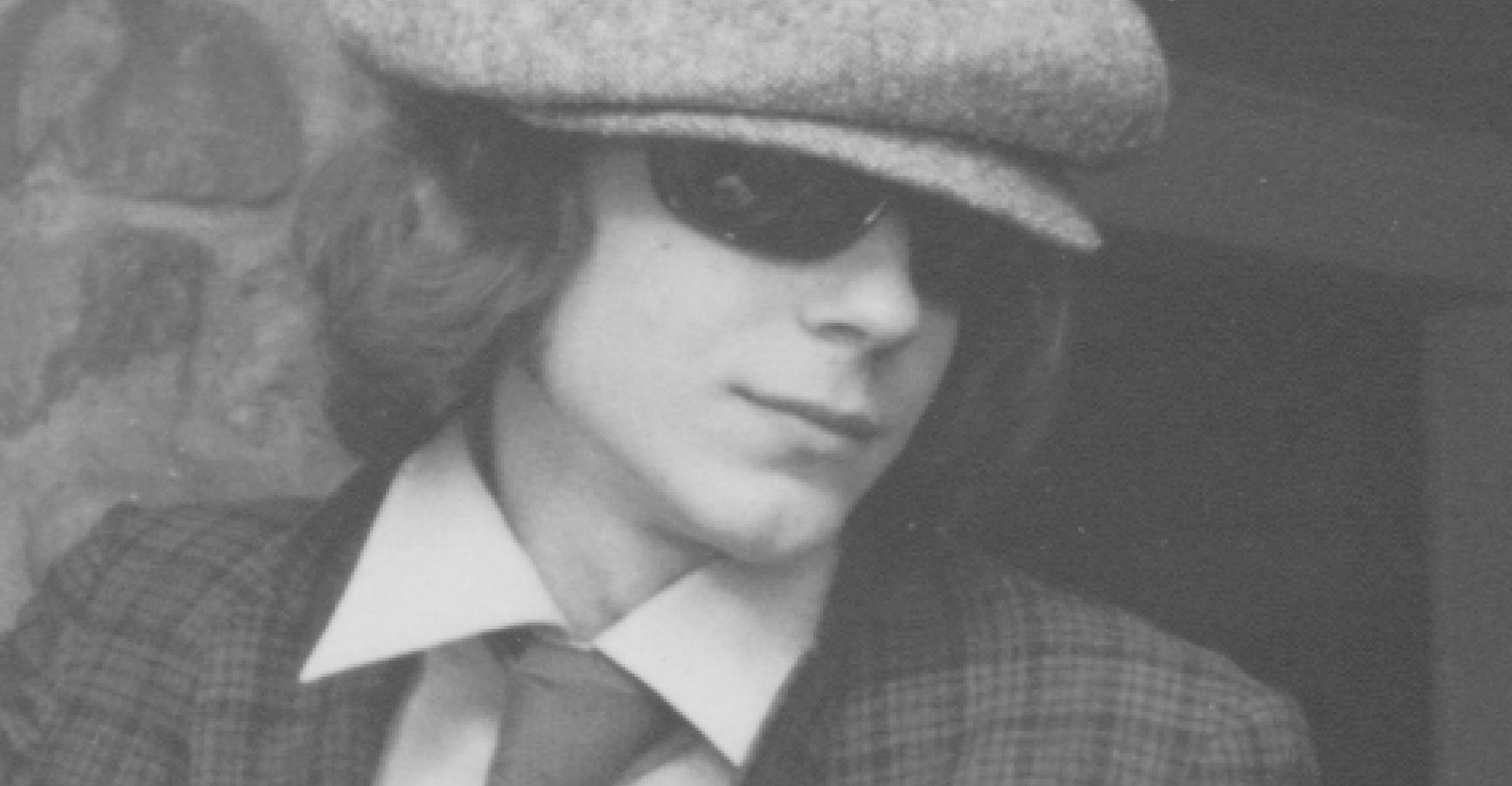Paul Constant is co-founder of The Seattle Review of Books and a veteran literary critic whose works have appeared in numerous publications. For years, he covered politics for The Stranger, an alternative paper in Seattle. His short comic story “The Fairgrounds Horror”—starring Stinger, the crime-fighting kid—appears in THE WRONG EARTH #1. It is his first foray into comics, but—trust us here—it won’t be his last. AHOY publisher Hart Seely caught Paul on the phone during lunch hour.
OK, I’m in Syracuse, New York, and you’re in Seattle, right? The Emerald City?
That’s right.
Did you know that Syracuse calls itself the Emerald City?
I did not know that. And it seems like a blatant misrepresentation. Doesn’t it snow there, like, eight months out of the year?
Doesn’t matter. We had a mayor who put up signs calling Syracuse the Emerald City. So there. I don’t see how Seattle can claim the title Emerald City.
Have you ever been to Seattle?
No, but is Seattle full of emerald mines?
No, everything in Seattle is covered with moss, because it’s so damp from the rain.
Then why don’t they call it the Moss City?
Because there’s also fungus.
THEN CALL IT THE FUNGUS CITY!
If we called it the Fungus City, we wouldn’t have 10,000 people moving here practically every month. It’s advertising. It’s branding. We got there first. There are so many shades of green in Seattle that it’s ridiculous. Look, I’ve got nothing against Syracuse. You can be an Emerald City. That’s fine. But I guarantee that if you come to Seattle, you’ll see more shades of green than in Syracuse—particularly in February.
Sorry. I didn’t mean to yell. But those 10,000 people who are coming, half are from Syracuse. Upstate New York is losing population as fast as you are gaining it.
Well, I’m from Maine originally. And as you know, everybody from Maine is either dying of old age or moving out of state. I’m familiar with the East Coast Creep. I’m an East Coast Creep myself.
What the hell is an East Coast Creep?
A person with way too many pointed opinions about pizza.
You know, (AHOY editor Tom) Peyer used to always flag your writing for me, back when you worked for The Stranger. That must have been a crazy place.
It was a great time. I didn’t have any training as a journalist, and it probably showed in my writing. But at that time at The Stranger, you could go wherever your interests led. I was hired as a books intern, and they liked my writing, so they hired me to edit the Books page. I also had interests in politics, so I kept writing about it, and nobody told me to stop. I ended up being their correspondent for the 2012 presidential election. I went to the Republican and Democratic National Conventions, and I even shook Mitt Romney’s hand! It was a crazy experience. I doubt many reporters get a chance to just bumble around like that. I’ll always be grateful for that opportunity, because it allowed me to go where my interests led. Not many papers out there would allow that.
Wait a minute! How is Mitt Romney’s handshake?
Mitt Romney’s handshake has been tested in a laboratory to be entirely, 100 percent agreeable. He pumps your hand up and down, exactly two and a half times - just the right amount. He makes direct eye contact and smiles for just the perfect amount of time – it’s not weird, it doesn’t feel perfunctory. You could not grow a more acceptable handshake in a laboratory. The whole robotic thing - he comes by it naturally.
I once shook Al Gore’s hand. An advance guy was yipping at people like a sideway barker, saying, “You there! How’d ya like to shake the hand of Al Gore, next President of the United States!” Al locked in on me, walked up and we shook. His hand was a rock. One of the greatest handshakes in my life.
I remember staring into Mitt Romney’s eyes. There was nothing there, reflecting back. I’m not sure if I will ever recover from that feeling. But you know, I also met Chuck Schumer once, and he was his own carnival barker. He didn’t have anybody announce him. He just went, “HEY, IT’S CHUCK SCHUMER!” It was quite disconcerting.
Every politician needs the shake. If you don’t have it, you can’t get elected town schlump. But let’s back up here: We mentioned The Stranger. Some readers here might not know what The Stranger is, or was.
When I worked there, it was an alternative weekly. One of the originators of The Onion, Tim Keck, sold his share and moved to Seattle. He used Onion money to start The Stranger, along with a sex-advice columnist you may have heard of, Dan Savage. Together, from a filthy apartment in Seattle’s University District, they started it as a weekly newspaper. It’s been going now for thirtysomething years.
It was Seattle’s version of The Village Voice, but I think it was a little smaller and a little ruder than The Village Voice sometimes. Over time, it became one of the great alternative newspapers in this country. I worked at the same time as Lindy West, who is now a big-shot memoirist and a feminist icon. Her memoir about working at The Stranger is called Shrill, and she’s adapting it right now as a TV show for Hulu.
I was there when The Stranger was sort of coming into prominence—we endorsed a mayoral candidate who won, which was bizarre. We got a socialist elected to the Seattle City Council years before Bernie Sanders made socialism cool. A coworker even won a (well-deserved) Pulitzer Prize while I was there, but it always felt like we were getting away with something illicit somehow. So, The Stranger is still around. It’s published every two weeks now. When I left, I just didn’t think it was going down the right road. Now, four years later, they only have one general arts writer—they used to have one for books, one for theater, one for visual arts—and they don’t really have a news presence. If you look at the masthead, there’s no news editor. They don’t have official news writers, or even an editor-in-chief. (Sighs.)
So, you moved from an alternative weekly to (attempts highbrow English accent) The Seattle Review of Books. (Worse attempt at accent:) Theee Seeeeeee-attile Reeeee-vieeeeuw of Booooooks.
The Seattle Review of Books.
The Seaatttttttttle Re-vee-ooooooh of Booooooks.
(Highbrow accent) The See-yattal Ruff-yoo of Boohk-gahs. Yeah, I co-founded it. But I didn’t come up with the name. It was the guy who started it with me, Martin McClellan. We were having dinner one night, shortly after I left The Stranger, and I was talking about how there was no full-time book critic left in Seattle—actually, sorry, there was one left, but now she’s gone—and we were talking about how it’s such a great book city, an international City of Literature, and that someone should be documenting what it’s like to live in such a remarkable literary city. And Martin said from across the table, “You should start a Seattle Review of Books.” I said, “That name’s gotta be taken.” So, he Googled it, and it was not taken, and we made a handshake deal that we would found it together, and it’s been going now for more than three years. So, yeah, it sounds highfalutin, but I do a weekly funnybook column where I write about comics, so I try to keep it as lowbrow as possible, while Martin valiantly attempts to elevate the discourse.
Okay, that sort of ruins my next question, which was going to be: What’s the co-founder of The Sea-aaaaaatle Re-vee-o-o-o of Bo-o-o-oks doing writing comics?
Hey, I learned how to read on comic books – from my older brother’s Superman comics, the bonanza collection of stories from the thirties to the seventies. I think I was three and a half, and I taught myself what was going on in the word balloons. That’s how I learned how to read. Those and the Charlie Brown paperback collections, they were my guiding stars. Way before I was reading anything highfalutin, I was reading comics. I’ve been obsessed with them my whole life. It’s in my blood. And I’ll tell you: It breaks my heart when I hear about parents not wanting their kids to read comics. Seems to me, you should just be grateful that your kids are reading. Comics are a great way to learn.
Are comics literature?
Yeah, of course! When I was at The Stranger, we had something that was called the Genius Award. It was a $5,000, no-strings-attached award to Seattle artists in various disciplines, and I was in charge of the Literature Award. One of the highlights of my time there was when we made Jim Woodring, a cartoonist who makes these amazing graphic novels, one of our Literature Geniuses. I was especially proud to give him a literature award because his comics are almost always wordless and so identifying them as literature felt like an important statement. So, yeah, I think comics are absolutely literature, and I’d be surprised if that is even seriously debated anymore. Over the last 20 years, the ascendancy of comics as an art form has been incredible.
You’re a literary critic. Did you have to sort of reinvent the wheel, personally, to write a comic book?
When I was in high school I had an artist friend, and we did a bunch of mini-comics. Of course, they were horrible, and if you ever find one I implore you to shred them. But it’s something I had experience with while growing up. When I started working at The Stranger, I abandoned writing comics, pretty much because I had a full time writing gig. But I’d written hundreds of pages of comics, years and years ago. They were awful comics, which is maybe the best way to learn how to write—fail repeatedly on a small scale so you can eventually, hopefully, get better.
Also, I’ve interviewed a ton of great Seattle cartoonists and comic writers like Peter Bagge and Ellen Forney and David Lasky and G. Willow Wilson over the years. So I’ve learned tips and tricks from them along the way, even if they didn’t realize that they were giving me a comics writing class for free. Suckers!
When I interviewed Willow, she said that writing comics dialogue was basically doing haiku. I think of that every time I write. When I try to trim a line to fit into a word balloon without losing its meaning, it’s absolutely like writing poetry. I would never have come to that on my own. I simply had some of the best teachers in the business, though they didn’t know it at the time.
As a book critic, do you ever get intimidated by hotshot writers? Did you ever tell Truman Capote he’s an idiot?
The most famous writer I’ve ever written negative reviews of has been Jonathan Franzen. He doesn’t return my calls.
Critics are supposed to wield a poison pen. Do you have one?
No. I mean, that’s a perception. I have written negative reviews, for sure. And when I was starting out in the business, I definitely wrote some particularly nasty ones. There’s a great line from Joseph Pulitzer: “A newspaper should have no friends.” I subscribe to that in my reviewing style.
I wrote a review of Willow Wilson’s memoir, The Butterfly Mosque, that wasn’t strictly negative, but her publisher wasn’t going to put it on any book-jacket covers. She was very gracious about it—she acknowledged that review when I interviewed her on stage years later. She’s moved on, and I’ve written some very positive reviews of her comics and her novel in the time since. If I write a negative review of your book, it’s not as if I’m giving a negative review of you as a person. It’s my take on a work of art.
That’s another thing about criticism that people don’t always get: if I see something as bad, that doesn’t mean I’m saying it’s a universal law that the book is bad. I’m just saying my interaction with that book was not great—and if you think of literature the way that I do, then maybe you should not read this book. It’s all relational. I mean, I’m just a schlub, right? I don’t have a degree in literature. I’m just somebody who loves literature, and as a result of that, I have my own opinions about it. They are totally mine.
And I’m not gonna lie. Some of the early reviews of THE WRONG EARTH that mentioned my Stinger short story—those positive reviews had me walking on air. I’m sure when I get that first bad review it will keep me up at night, but I will hopefully maintain the understanding that we’re all just monkeys on typewriters. It’s not the end of the world.
So you never had Danielle Steel pour hot coffee on your head?
No. But I’ve had poets tell me that I ruined their day with a review, and I’ve had some especially awkward interactions at parties. I mean, yeah, there are egos involved. I’ve never had anybody come at me the way that Richard Ford spat at Colson Whitehead one time—though that’s a career goal of mine. I’ve made enemies. I’ve had Facebook groups devoted to hating on my reviews, I’ve had novelists turn around and quietly walk away when they found out who I am. I don’t revel in those confrontations. But they don’t turn my stomach, either.
Switching gears, here’s a question I ask everybody. Who is the one superhero that you would not want to be working for, say as a personal assistant?
I would have to say Batman. Some rich people are very nice, but they are generally not like the rest of us. The richer they get, the odder they get. I’m talking about Bruce Wayne-type rich people, like Elon Musk, who are stewing in their own juices. They stop having empathy for people, which I think is essential for day-to-day life. I’m sure that Bruce Wayne, having always been rich, has no real idea what the human experience is like. So, I think working for Wayne Enterprises would be terrible. Also, Batman has no sense of humor. I would not want to work in that environment.
If you were Batman’s personal assistant, you’d spend all your time at charity bazaars.
Yeah, and usually those are no fun. The food is not great. The company is not good. There’s always a couple of people who get stinking drunk and get too familiar with you.
They’d throw up, and you’d be the one to clean it, because Alfred’s not going to.
Exactly! You know, Alfred is like the top one percent of assistants. He doesn’t deal with that day-to-day grind.
Okay, so who would be the best supervillain to work for.
A nice supervillain employer…that’s a tough one, because many of them are always killing their employees.
Yes, you do want one who won’t kill you.
That’s a good rule of thumb. I’ve always been fond of working-class villains like the Spider-Man villain, the Shocker. Not the Green Goblin—no wealthy industrialists. But I’d like to be with somebody who knows what it’s like to have worked a few crappy jobs. The Looter, maybe.
Sandman?
Yes, though I’d end up vacuuming sand out of everything, and that could be ethically troubling, because you wouldn’t know how much of the sand you’re throwing away was your boss. Maybe a Flash villain, somebody like Captain Cold. You’d get issued a nice parka when you signed on, right? That’s a perk.
Or Mirror Master, although he’d always be watching you.
Captain Boomerang.
They’d throw great parties. Electro, with the lampshade. If they were practical jokers, they’d be phenomenal.
The Prankster. But actually, he would be awful to work for. He’d be like, “Pull my finger!” Or, “Sit down, whoops - a whoopie cushion, ha-ha!” You want people who aren’t funny as a premise. And you don’t want to work for the Joker.
Nope. No way.
You’d be back to that murdering employees thing.
A final philosophical question: You’ve worked as a bookseller, a book writer, and a book critic. So, can you really not tell a book by its cover?
I think you can definitely tell books by their covers. I mean, there will always be exceptions, but generally, a lot of thought goes into those book covers. Nowadays, you can pretty much tell what you’re going to get. When I was a bookseller, you could open up a box of new arrivals, and 95 percent of the time, the book would be exactly what you thought it was going to be.
Also, I tell people this: When you buy a book, the booksellers are totally judging you. I know you like to think you’re in a space where people aren’t paying attention to your purchases, but they are totally aware that you are buying erotic vampire fiction. There is a judgment going on every time you buy a book.
Well, someday, they’ll be judging your comic books.
Yes, and the bookseller will think, “Ahhh, now here’s a person with great taste!”

